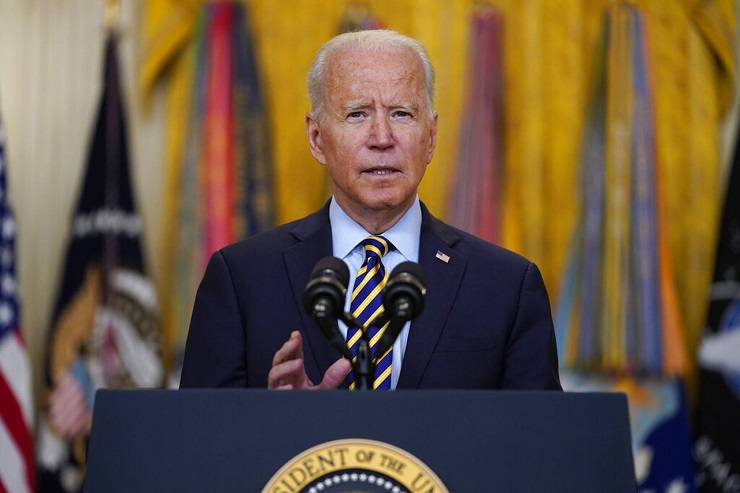When the US president Joe Biden decided to withdraw the US forces from Afghanistan and delivered his ‘victory speech’, he didn’t sound like a winning commander-in-chief of the world’s supposedly most powerful military force, especially the one that failed to defeat the Taliban (banned in Russia) even after 20 years of war. America’s self-perceived and self-nurtured sense of invincibility has been further shattered by the Taliban’s ability to rapidly gain control of the territories previously under the control of Kabul and the US forces. The sense of loss has been further compounded by the collapse of the US-trained, advised and funded Afghan National Security Forces. The prevailing military and political chaos in Afghanistan has certainly left the Joe Biden administration with no means to celebrate the ‘end’ of the US’ longest war. On the contrary, the very rapidity of the collapse has revived memories of the chaos that had followed the US (partial) withdrawal from Iraq in 2011, a mayhem that largely facilitated the emergence of Daesh in Levant and the subsequent wars in Iraq and Syria involving the US, Russia, Iran, Turkey and Syria and Iraq themselves.
Politically speaking, the prevailing post-withdrawal scenario, while not a solo doing of the Biden administration itself, will still have serious political implications for Joe Biden himself, for he will be remembered as the president who helped dispatch Afghanistan into this chaos because of his administration’s failure to help achieve a political settlement. While three of Biden’s predecessors made the decisions that kept the war going for two decades, it was/is ultimately Joe Biden who rejected the advise given by his senior military and policy advisers and decided to pull the plug too quickly and too recklessly to allow for an intra-Afghan political settlement. In fact, his own decision to extend withdrawal date from May to September has proven absolutely meaningless in terms of effecting a meaningful political transition in Afghanistan. When Joe Biden announced in April to extend withdrawal from May to September, he said he did not want to “conduct a hasty rush to the exit,” adding it will be made “responsibly, deliberately and safely.”
However, the chaos that has erupted as soon as the US started withdrawing proved that withdrawal was not “responsible.” The fact that the US withdrew in July instead of September shows that withdrawal was/is equally ‘hasty’ as well. As many political observers in the US believe, Biden didn’t expect the chaos to follow that quickly, which is why he has now been convinced to start a war of attrition in Afghanistan by periodically striking the rapidly advancing Taliban forces.
In his latest telephonic conversation with Ashraf Ghani, Biden said that the “Taliban’s current offensive is in direct contradiction to the movement’s claim to support a negotiated settlement of the conflict”, adding that the US will “continue supporting the Afghan security forces to defend themselves.”
Biden’s phone call confirmed, for now, that the US has got Ghani’s back, and that the Afghan National Security Forces must continue to fight. As Ghani’s readout of the call says, “President Biden reassured President Ghani that support for the ANDSF will continue. President Ghani expressed his confidence that the ANDSF will protect and defend Afghanistan.”
Biden’s renewed commitment to support the Ghani regime shows that the US has taken a direct plunge into the so-called Afghan ‘civil war’ and that it wants to prevent a Taliban walkover for as long a period as possible. The decision to re-start air strikes from its bases in the Middle East once again shows Biden’s sharp disillusionment. On July 11, when asked about the situation in Afghanistan, Biden said, “…I trust the capacity of the Afghan military, who is better trained, better equipped and more competent in terms of conducting war.” Two weeks later, the Biden administration’s decision to relaunch air strikes against the Taliban shows a degree of disbelief in the ability of the US trained, advised and funded Afghan National Security Forces to pushback against the Taliban’s territorial gains.
Biden aims to off-set this disbelief and avoid being labelled as the mastermind of chaos in Afghanistan through a tacit return to the US’ notorious policy of “armed overwatch”, a combination of strategies — including the CIA and special operations forces, airpower, and aid to security forces – the US has been using since at least 2001 to target militant groups and weaken them vis-à-vis pro-US forces and groups.
A deliberate resort to “armed overwatch” has also become a strategic necessity in the wake of the growing Russian and Chinese involvement in Afghanistan, which Washington sees as largely pro-Taliban. While Russia and China are mainly interested in preventing the chaos and jihadi networks from spreading into Central and East Asia (which could really destabilise the Belt & Road Initiative and Eurasian Economic Union), their increasing sway over Afghanistan will, Biden seems to have been advised, also allow political opposition at home to project this as yet another defeat, like Syria, for the US at the hands of Russia (and China). This will turn Biden from someone who ‘ended’ the US war into someone who could neither deter the Taliban into taking a more reasonable and less violent path, nor prevent Afghanistan from becoming a Russia-China stronghold.
The return to “armed overwatch”, even though the US ability to conduct such operations is limited in the absence of military bases closer to Afghanistan, will allow the Biden administration to maintain the emblem of “resistance” against the Taliban and their so-called supporters i.e., Russia, China and Iran. This, in turn, will help him politically against his political opponents who are already accusing him for capitulating to the Taliban and ignoring the presence of al-Qaeda and the IS-K in Afghanistan.
Salman Rafi Sheikh, research-analyst of International Relations and Pakistan’s foreign and domestic affairs, exclusively for the online magazine “New Eastern Outlook”.
Related posts:
Views: 0
 RSS Feed
RSS Feed

















 August 3rd, 2021
August 3rd, 2021  Awake Goy
Awake Goy 
 Posted in
Posted in  Tags:
Tags: 
















